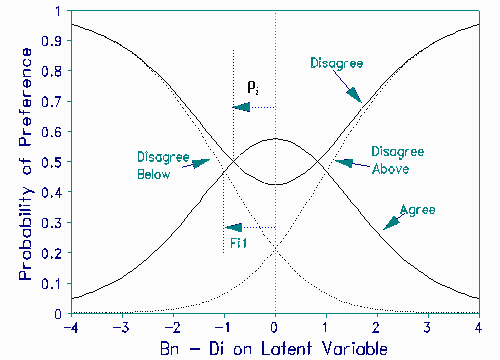The Hyperbolic Cosine Model (HCM, Andrich & Luo, 1993) for dichotomous unfolding responses is derived from the Rasch model for 3-ordered-category responses, but is not, itself, a Rasch model. Consider a dichotomous preference item: "I owe a lot to my parents" (Agree/Disagree). The meaning of Agree seems obvious. But what does Disagree mean? I owe little to my parents? I owe everything to my parents? Thus, in constructing the HCM, the Disagree response is resolved into two latent components. One component is, Disagree below, "I owe a little ..." The other is Disagree above, "I owe everything ..."
A Rasch model for three ordered categories is:
![]()
where k=0 is "Disagree below", k=1 is "Agree", and k=2 is "Disagree above", and ΣFik=0. The HCM function for a Disagree response, PniD, is the sum of the probabilities of the "Disagree below" and "Disagree above" categories. The Agree category remains as PniA. Summing,

A convenient identity for the hyperbolic cosine is:
![]()
So that, after reparameterization (Andrich, 1996; Luo, 1998), the HCM can be expressed more elegantly as:
![]()
where
![]()
It is seen that PniA = PniD = 0.5 when ρi = Bn - Di or, because cosh(x) = cosh(-x), when -ρi = Bn - Di . Thus the new parameter, ρi, is half the distance between the two crossing points of the Agree and Disagree response curves. This characterizes the latitude of acceptance, an important concept in attitude measurement. Note that this model requires that the probability of observing Agree reach .5 at some point along the latent variable. The Figure shows the HCM functions and the corresponding Rasch model for 3 categories (in dotted lines).

|
Why is HCM not a Rasch model? Rasch models require parameter separability or, in statistical terms, sufficient statistics. HCM does not have these.
Choosing a Response Model
If the data follow the Rasch (or other cumulative) model, responses are positively correlated across items. If the data follow the HCM (or other unfolding model), an item has positive correlations with nearby items, but negative correlations with distant items. The HCM equation has been expanded into a general form for dichotomous unfolding responses (Luo, 1998), and then into a general form for polytomous unfolding responses (Luo, 2001).
Guanzhong Luo, Murdoch University, Australia
Andrich, D. (1996). A hyperbolic cosine latent trait model for unfolding polytomous responses: reconciling Thurstone and Likert methodologies. British Journal of Mathematical and Statistical Psychology, 49, 347-365.
Andrich, D. & Luo, G. (1993). A hyperbolic cosine latent trait model for unfolding dichotomous single-stimulus responses. Applied Psychological Measurement, 17, 253-276.
Luo, G. (1998). A general formulation of unidimensional unfolding and pairwise preference models: making explicit the latitude of acceptance. Journal of Mathematical Psychology. 42, 400-417.
Luo, G. (2001). A class of probabilistic unfolding models for polytomous responses. Journal of Mathematical Psychology. 45, 224-248.
Hyperbolic cosine unfolding quasi-Rasch model. Luo G. … 16:1 p.870
Hyperbolic cosine unfolding quasi-Rasch model. Luo G. … Rasch Measurement Transactions, 2002, 16:1 p.870
| Forum | Rasch Measurement Forum to discuss any Rasch-related topic |
Go to Top of Page
Go to index of all Rasch Measurement Transactions
AERA members: Join the Rasch Measurement SIG and receive the printed version of RMT
Some back issues of RMT are available as bound volumes
Subscribe to Journal of Applied Measurement
Go to Institute for Objective Measurement Home Page. The Rasch Measurement SIG (AERA) thanks the Institute for Objective Measurement for inviting the publication of Rasch Measurement Transactions on the Institute's website, www.rasch.org.
| Coming Rasch-related Events | |
|---|---|
| Jan. 16 - Feb. 13, 2025, Fri.-Fri. | On-line workshop: Rasch Measurement - Core Topics (E. Smith, Winsteps), www.statistics.com |
| Apr. 8 - Apr. 11, 2026, Wed.-Sat. | National Council for Measurement in Education - Los Angeles, CA, ncme.org/events/2026-annual-meeting |
| Apr. 8 - Apr. 12, 2026, Wed.-Sun. | American Educational Research Association - Los Angeles, CA, www.aera.net/AERA2026 |
| May. 15 - June 12, 2026, Fri.-Fri. | On-line workshop: Rasch Measurement - Core Topics (E. Smith, Winsteps), www.statistics.com |
| June 19 - July 25, 2026, Fri.-Sat. | On-line workshop: Rasch Measurement - Further Topics (E. Smith, Winsteps), www.statistics.com |
The URL of this page is www.rasch.org/rmt/rmt161p.htm
Website: www.rasch.org/rmt/contents.htm